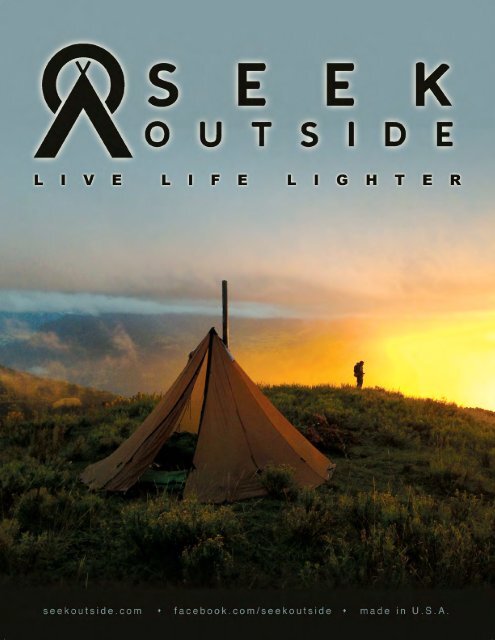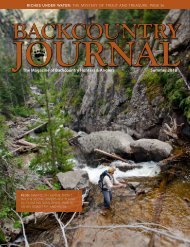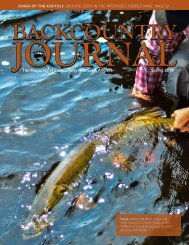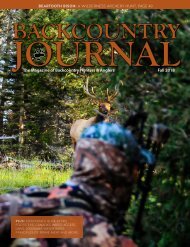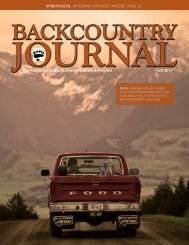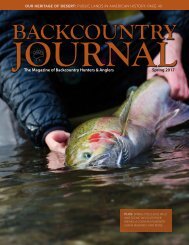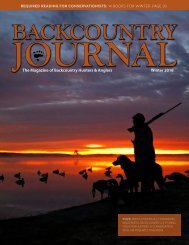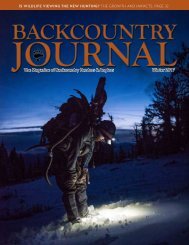BCJ_SUMMER17 Digital Edition
Create successful ePaper yourself
Turn your PDF publications into a flip-book with our unique Google optimized e-Paper software.
BEYOND FAIR CHASE<br />
THE<br />
CONSERVATION<br />
ETHIC<br />
BY JIM POSEWITZ<br />
AS HUNTERS, OUR RELATIONSHIP WITH THE ANIMALS<br />
we pursue in fair chase is experimental. In looking across human<br />
history, it is hard to find anything like the association between<br />
hunters and the hunted that has developed in North America. In<br />
most places, and through most of recent human history, wildlife<br />
belonged to those of privilege or property. Hunting was, and in<br />
most places on earth today remains, the sport of kings.<br />
Before we address the ethics of hunting we need to look at why<br />
most of us can even aspire to be a hunter. When America was<br />
colonized, it was common practice for the royalty of Europe to<br />
grant land to relatives. Some of those land grants here in America<br />
included, in the language of the times, “The fishings, hawkings,<br />
huntings, and fowlings.”<br />
The American Revolution separated us from the king and produced<br />
a system of free people governing themselves. Fish and<br />
wildlife were not mentioned in any of our founding documents.<br />
The void was filled by court decisions that established water, fish<br />
and wildlife as public resources held in trust by the states for the<br />
benefit of all the people. Their words at the time were “When<br />
the revolution took place, the people … became themselves sovereign.”<br />
In short, since you and I are sovereign, the king’s deer<br />
became the people’s deer. America would have a democracy of<br />
the wild.<br />
When that initial court decision was issued in 1842, Montana<br />
had a wildlife resource that “For variety and abundance exceeded<br />
anything the eye of man had ever looked upon,” to quote Meriwether<br />
Lewis. Forty-one years later, a young Theodore Roosevelt<br />
came West to hunt buffalo. He borrowed a gun, hired a guide and<br />
hunted for nine days through the rotting carcasses of the last commercial<br />
slaughter before finding and shooting a lone, wandering<br />
bull. He found that buffalo on Little Cannon Ball Creek, Montana<br />
Territory. Two years later, TR would write of a ranchman<br />
who made a journey of 1,000 miles across northern Montana and<br />
was, “Never out of sight of a dead buffalo and never in sight of a<br />
live one.” Montana was the wildlife boneyard of a continent.<br />
Such experiences contributed to a conservation epiphany<br />
among a handful of visionary hunters. In 1887, they formed a<br />
citizen-based hunting club to introduce the fair chase sporting<br />
code and restore big game to America. Four years later, they lobbied<br />
a provision through Congress allowing presidents to set aside<br />
unclaimed lands for conservation purposes. When TR became<br />
president, he used that authority to set aside almost 10 percent<br />
of America for wildlife restoration along with public forest conservation.<br />
A generation later, when an economic depression and<br />
the Dust Bowl had our country on its knees, hunters championed<br />
an excise tax on firearms and ammunition to fund the struggling<br />
wildlife’s restoration.<br />
Today we take to the field in pursuit of a wonderfully restored<br />
wild abundance in relationship with nature, perhaps unique in<br />
human history. When we take rifle in hand and head for the<br />
outdoors, it is essential that we also carry the conservation ethic<br />
that put both you and the game in the field. We as hunters need<br />
to embrace the truth that we and the antelope, deer, elk, geese<br />
and ducks we pursue sprouted from the same diamond buried<br />
in our American heritage. Once we accept and remember that<br />
exceptional reality, the decisions made afield will be easy. We will<br />
respect the animals, honor the relationship we share with them,<br />
afford them fair chase and measure up to the conservation ethic<br />
generations of hunters passed to our custody.<br />
As a minority, hunters are often asked, “Why do you hunt?”<br />
Once you learn of the power and beauty in the North American<br />
hunting heritage, you can simply answer, “Because it matters.”<br />
Jim founded Orion-The Hunter’s Institute in 1993 after a 32-year<br />
career with Montana Fish, Wildlife and Parks, where he started as<br />
a fisheries biologist then lead the ecological program for 15 years. He<br />
is the author of four books including the classic, Beyond Fair Chase:<br />
The Ethic and Tradition of Hunting, with more than 800,000 copies<br />
in print. BHA’s annual award for leadership in fair chase ethics is<br />
named in Jim’s honor.<br />
This new Backcountry Journal department is brought to you by<br />
Orion: The Hunter’s Institute, a nonprofit and BHA partner dedicated<br />
to advancing hunting ethics and wildlife conservation. To learn more,<br />
visit orionhunters.org. To comment on and discuss this article and<br />
others, go to backcountryhunters.org/fair_chase.<br />
20 | BACKCOUNTRY JOURNAL SUMMER 2017<br />
SUMMER 2017 BACKCOUNTRY JOURNAL | 21


